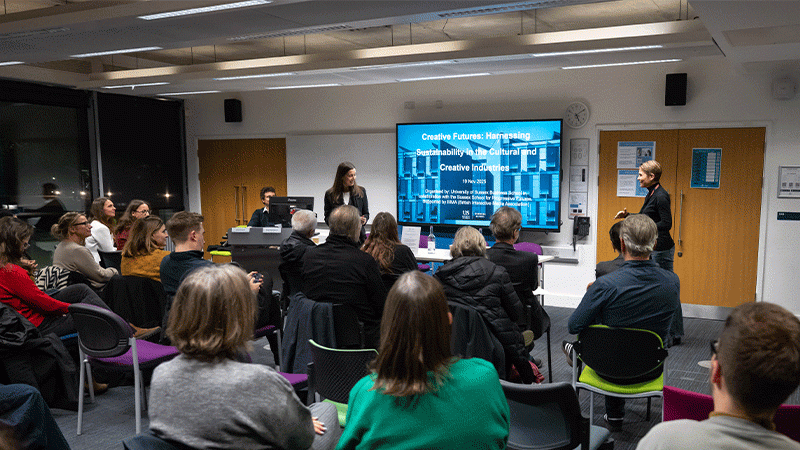Dr Ilaria Pappalepore, Reader in Tourism and Events from Westminster Business School at the University of Westminster, recently participated in a panel event on sustainability in the cultural and creative industries. The panel offered industry, policy and funding perspectives and explored key issues and implications for the sectors.

Held on 19 November, this event was organised by The Mobiliser in Creative and Digital Economy at the University of Sussex, in collaboration with the Sussex School for Progressive Futures, and was supported by the British Interactive Media Association (BIMA).
The panellists were Professor Caroline Lucas, Professor of Practice in Environmental Sustainability at the University of Sussex and former Leader of the Green Party of England and Wales and Member of Parliament for Brighton Pavilion; Jon Linstrum, Senior Relationship Manager and Environmental Responsibility South East Lead of Arts Council England; and Angus Light, Co-founder and Executive Producer at Locate Productions and member of Creatives for Climate.
The panellists highlighted the need to better support small and micro-enterprises in adopting sustainable practices, noting that sustainability is often treated as an optional extra and may be perceived as costly. They called for environmental responsibility to be given equal weight to inclusivity in funding decisions and emphasised the need for a cultural shift in how sustainability is communicated, especially to younger audiences.
Speakers also emphasised the power of storytelling and creativity in shaping positive climate narratives, discussed the sectors’ role in reducing their own environmental impact while inspiring wider behavioural change and raised concerns about the environmental costs of technologies like AI.
Dr Pappalepore also spoke with the panellists and audience about the role creativity can play in shaping a more sustainable future, such as its potential to expand ecological awareness, communicate climate urgency and inspire behavioural and societal change. She also addressed its environmental challenges, particularly regarding the fact that the cultural and creative industries rely on tangible production systems, often on a global scale, and produce tangible outputs which can leave significant environmental footprints.
The event also included a presentation on two recently published books co-edited by Dr Pappalepore from the University of Westminster and Professor Elisa Salvador from ESSCA (France). These are Responsible Consumption and Production in the Creative and Cultural Industries: Actions, Policies and Strategies for a Sustainable Future, and Responsible Cultural Consumption and Production: Insights from Live Experiences, Film and Fashion. The books investigate how the sector can adopt more sustainable production models, the policies and strategies needed to support this transition and how cultural experiences, from live events to film and fashion, can both reduce their own impacts and influence more responsible consumption patterns among audiences.
Dr Pappalepore said: “This event offered a fantastic opportunity to explore the crucial role that these industries can play in driving the sustainable transition, both by innovating within their own practices and, perhaps more importantly, by inspiring behavioural change among audiences through the cultural and creative content they produce. It was also wonderful for my co-editor, Elisa Salvador, and I to share our two volumes on this topic. I would like to express my thanks to the organisers Mariachiara Restuccia, Monica Masucci and Roberto Camerani from the University of Sussex for putting together such an enriching event and to the three inspiring panellists for generously contributing their time.”
Dr Pappalepore’s contribution to the discussion around sustainability in the industry directly supports the United Nations Sustainable Development Goals (SDG) 12: Responsible Consumption and Production and 17: Partnerships for the Goals. Since 2019, the University of Westminster has used the SDGs holistically to frame strategic decisions to help students and colleagues fulfil their potential and contribute to a more sustainable, equitable and healthier society.
Learn more about Tourism and Events Management courses at the University of Westminster.





